‘Bloodline’ Postmortem: Star Norbert Leo Butz Talks About Kevin’s Finale Shocker
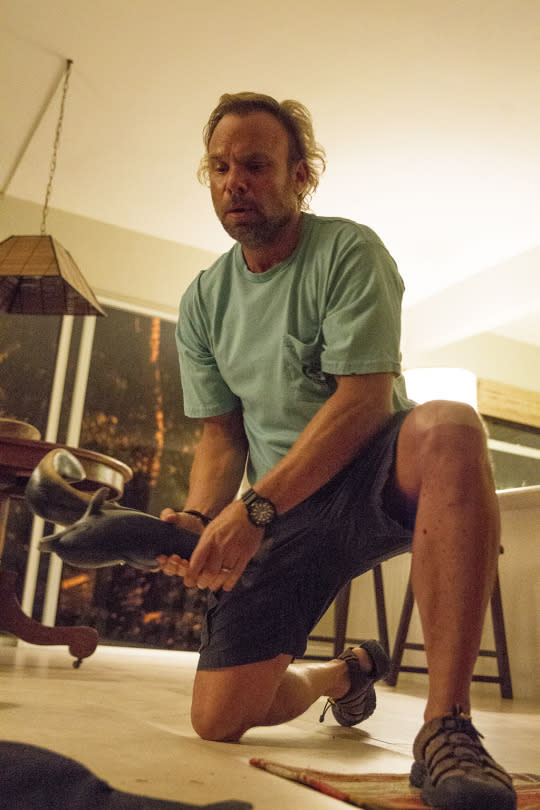
(Photos: Netflix)
Warning: This interview contains storyline and character spoilers for Bloodline Season 2.
Bloodline Season 2 found the Rayburn siblings digging themselves even deeper into the murder hole, with a season finale that could be summed up as “We Know What Kevin Did This Summer.” With he and brother John and sister Meg turning on each other at various points, a desperate Kevin turned to John’s cop partner Marco for in a last ditch bid to save himself, and when Marco brutally rejected Kevin’s pleas for help, Kevin brutally rejected Marco’s desire to continue breathing.
Kevin’s Emmy-worthy portrayer Norbert Leo Butz, the two-time Tony Award winner who’s also a regular on the PBS period medical drama Mercy Street, talked to Yahoo TV about Kevin’s surprising path this season, about the unusual production practices that lead to the show’s tense mix of chaos and slow-burn vibe, and his hopes for where Kevin will go now that the Netflix series has been greenlit for a third season.

And as someone with 10 siblings — he’s the seventh of 11 children — Butz also suggests there’s much to be learned from the complicated interactions of the family Rayburn.
We got to know Kevin a lot better in Season 2. What did you think when you found out about the arc for him this season?
Well, you don’t really get an arc. That’s not how {series creators Todd and Glenn Kessler and Daniel Zelman} work. We don’t get scripts in advance. I want to say for Season 2, we maybe got the first episode a couple weeks before we started. Because they’re editing, basically, while they’re shooting, so much of the work they do is in post. They have to kind of be doing post while they’re still producing the next episode. Scripts are coming, really, just before we start shooting. Then, rewrites are coming the day before, sometimes the morning of. It really keeps you on your toes, to say the least. It means you have to be really flexible. You have to be really open. You have to be able to assimilate very, very quickly.
It can be a challenge, especially when there’s a good bit of text to memorize, but as I’ve gone along, now, finishing the second season, I’ve learned how to develop those muscles a little bit. A lot of it’s just about trust. You form relationships with your writers, with the creators, and with your castmates, as you go along. We have 23 episodes behind us, and it was terrifying at first. It’s kind of like you’re dating someone new. You’re getting to know them, but as it goes on, and once you have your freak-out, alone in your apartment, thinking, “What?!,” you learn to trust that they have your back, that they have ideas about where it’s going. In the moment, sometimes, on your days when you’re not feeling as confident about yourself, when you want more control, you can be tempted to think, “Oh, my gosh. Is it just random?” It took me a long time to be able to watch Bloodline, but I have finally watched all of it. It’s a show for the viewers. [The series creators] have been good on their word to tell a story that may seem, in the moment while you’re playing it, contradictory or even implausible. Then, in the wider arc of the narrative, it makes a kind of tragic sense. The production values continue to be so excellent, the actors continue to be so good to work with that you just trust. The way I go about working on the show… I know I’m giving you a long-winded answer…
Related: Emmy Talk: The Award-Worthy ‘Bloodline’ Family
No, it’s fun to learn about how the show is made, especially since it is much different than how most other TV series work.
I’ve mostly done plays and mostly new plays and musicals… we get rewrites all the time in preview periods of plays and musicals. Writers are in the room with us, and they’re handing new songs and new lyrics and new rewrites all the time. You’re putting them in the show at night, and [this] is not dissimilar from that. You assimilate it quickly, and you get your brain out of the process. You respond viscerally, in a kinetic way, which is very, very good for [working on] Bloodline. I don’t know that it would work on a procedural, obviously. I don’t know that it would work on a different kind of show, but for these characters, in this situation, most of the time, that’s the whole point. They don’t know their head from their a–es. They are in situations that are not familiar to them, but that are unfamiliar to most people… but that are completely plausible, I feel. Horrible things happen to families… who’s to say how people will behave in the moment, when faced with almost unspeakably difficult, traumatic, even, circumstances.
In the playing of it, sometimes you’re grappling for that next line. Sometimes you’re really off your center, and for me, especially for Kevin, that’s where he lives, man. That’s where he lives, psychologically. That makes a kind of sense. I really love it. It’s a challenge, but I’ve really been up for it. The more I just stay open and just dive in and trust, they really do have our backs. I was really pleased with Season 1, and I thought they did a great, great job with Season 2, as unpleasant as it was to go through it. I just really believe in their final product. I’m at the point where I’ll go anywhere they tell me to go and be OK with not knowing and not even really contributing to the conversation of where it’s going.
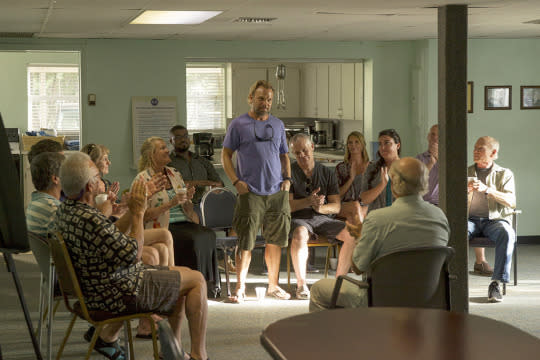
The story of the Rayburns is chaotic, but also unfolds in a slow burn way. Does the storytelling, the way you film with last-minute script changes and not always knowing your character’s story in advance, does it add to the tension and chaos of the story?
Yeah, but keep in mind… oftentimes, I don’t know what’s happening in the other storylines. I really don’t. I don’t have to. I have learned to really just approach my scenes like each one is its own little movie. It has a beginning, a middle, and an end. That is the entire story. Nothing came before, and nothing came after. I really do try to approach it like that because, at first, you try to keep up with the rewrites… and sometimes they’ll have [second unit] that will go back a couple of episodes and add story and characters to an episode that you’ve already wrapped.
I had this moment in Season 1… I just really couldn’t bring myself to watch it. I felt self-conscious and weird, but my wife was binging it, right? I would pass through the living room and look at the TV, and I had this really out-of-body experience. Somewhere, halfway through Season 1, I looked at the TV screen, and I could not tell you who one character was on the screen or what they were talking about. I had no memory, no recollection of whatever that narrative was. Nor did I need to, because it had nothing to do with what Kevin would have been privy to at that time. It’s not information that I would need in order to do my work. It is all of the same world, so I don’t have to figure out that slow burn of the narrative. I have a very clear point of view on a very clear action in the scenes that I’m given. You commit. You throw yourself into the pool. I wouldn’t say they’re necessarily collaborative in where the story’s going, but they’re very collaborative on the set, I have found. In other words, “Hey, man. This line isn’t getting me to where I need to go,” or, “Didn’t I say something really similar to that in a previous scene?” And [the writers] are, “Oh, yes,” or, you say, “Can I try it one time like this?” And they’re, “Absolutely.”
Related: ‘Bloodline’ Star Owen Teague Understands Why You Think He’s Ben Mendelsohn’s Son
While you’re there, you really are contributing to that scene. “Can we shoot this outside, maybe, and not inside? Because I feel like it…” If they can, they’ll accommodate all of that. I can’t really speak to the overall slow burn nature of the thing. That’s something that they use so many technical qualities to accomplish, that soundtrack and those eerie noises throughout and the panoramic, kind of, eerie, quiet shots… all of those things, which I have no idea that they’re doing that, when we’re filming. You know what I mean? I think we’re on this roller coaster of a fast-paced thriller, and then you hear everybody call it a slow burn. I’m like, “Wow,” which is cool, because that’s their craft as filmmakers.
What was your reaction when you found out Kevin kills Marco in the season finale?
Oh, yeah. That was tough. That was really, really tough, but it was a real lesson of letting go. The actor’s job, it’s really to not… I guess it sounds kind of controversial, because it makes it sound like we’re sheep or something. The less, sort of, intellectualizing I do about anything, whether it’s Bloodline or anything I’m working on, the better off I am. You don’t want to get in your head, as an actor. You want to figure out what physically needs to be accomplished in the scene, what the story is, what the character’s goals are, and all of those things.
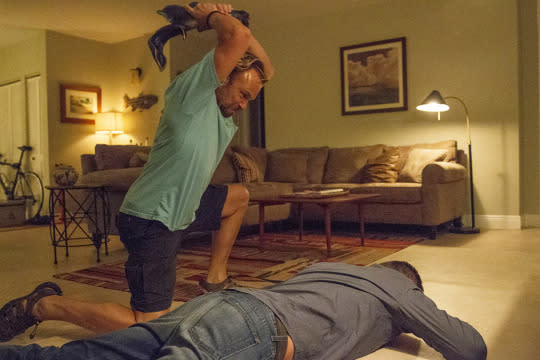
When I did watch it, and see it in context with what’s happening with John and Meg and Sally, what’s happening with Eric, what’s happening within the world of Bloodline, it’s like, "I completely think this is a valid, really valid choice.” It’s not the only valid choice, but it’s really valid. It makes for just incredible possibilities for Season 3, too, so it’s also very smart. For all those reasons, again, I just learned, “Hey, just trust. It’s going to be a really good, quality story.”
The thing that’s most shocking about Kevin killing Marco is that he is capable of that kind of violence. Did you think the character was capable of doing something like that?
No, I didn’t, and I spent a long time grappling with that. Then, I don’t know, it just hit me like a bolt of lightning, “Hello, this is the theme of the entire show.” No one in that family thinks they’re capable of doing anything that they’re doing. That’s, I think, the great, huge, epic-sized theme that these guys are going after. We like morality parsed out into neat little boxes. They’re posing the question: Does it really work like that? When you’re fighting for survival, when you tap into really primal fears and primal emotions, what are we capable of, as people? What are good people capable of, in the name of loyalty, or what are we capable of in response to childhood trauma or long-suppressed neuroses, unaddressed addiction, abuse, all of those things?
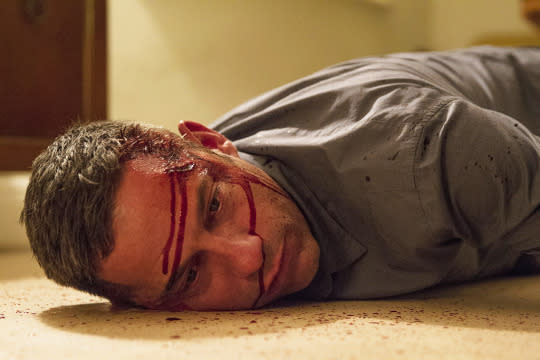
One of the best scenes of Season 2 is the Episode 3 sequence with Meg and Kevin in the motel room, trying to keep their heads together, these two siblings who didn’t have a direct hand in the murder of their brother, but yet who are right in the middle of the drama. Given your theater background, did it feel like a play to you?
Absolutely, and we shot it all in one day. We shot it on a set, not in a real hotel. They built this incredible set on the stages. That’s exactly what it felt like, like we were doing a Sam Shepard play, which is just fantastic because, you know, Sam’s the Rayburn patriarch in Bloodline. The days when [Kyle Chandler, Linda Cardellini, and I] get to work together are some of my happiest days on the show, just because they’re so extraordinary. I love them both so much. There’s just great trust. We’re starting to kind of play like a little jazz trio, and there’s just nothing you can’t do or say. I loved those scenes. I was so happy with it, because… that director was really wonderful, Jean de Segonzac. He wouldn’t talk a whole lot, he would just let us play it, run it, and run it and not get in our heads. In those scenes where I just got to grab Kyle and sob on his chest or Linda and I just got to be nasty to each other and then gentle with each other, it just all came out in the playing of it. I loved that day. It was exhausting. I will say that, man. I went home, and I think I slept for about 15 hours, because I had to stay in that kind of place. Kevin’s got a lot of substances playing havoc with his nervous system. That’s pretty hard to maintain, but I just loved it.
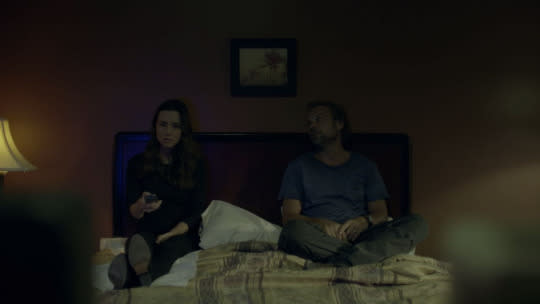
What do you hope happens in Season 3? Do you think Kevin can deal with what he’s done?
Well, he’s going to have to. If he wants to live, he’s going to have to. That’s what will be interesting to see. I mean, I hope he lives, literally, because now he has any number of people who want him gone, including his own siblings. I hope for Kevin that no matter what path he goes down, whether it’s on the good or the bad side of the law, I want him to believe that it’s right. I want him to be unapologetic in the thing he does next.
Norbert, thank you for being so generous with your time and talking about the season.
Oh, no, are you kidding? I love talking about Bloodline. I sit around with friends, and my wife does the same with her girlfriends, you know, talking about it… if human psychology interests you, you can really get into it. I think that’s really fun, that it’s entertaining, and can really get you talking about all these bigger ideas, which is awesome.
Bloodline would be a great anchor for a psychology course, especially on family dynamics.
Yeah, yeah. Maybe somebody will do it in, like, a sociology class. “Here’s the worst family model ever. Now, let’s see where you are on the spectrum.”
Bloodline Season 2 is streaming on Netlfix.

